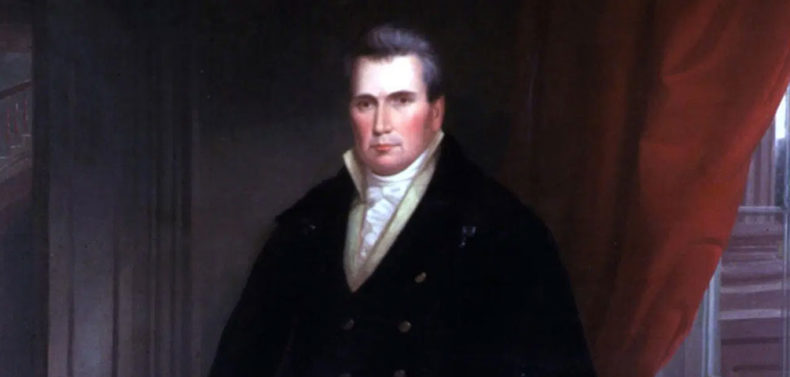While it might seem that the vitriolic, incendiary partisan attacks that tend to dominate the American political scene these days simply reflect the vast, seemingly irreconcilable differences that separate the two major parties, demonizing the other side seems even more imperative when it’s difficult to discern just what the genuinely noteworthy distinctions between the two groups might actually be. In such situations it’s by no means uncommon to see the standard bearers for both cohorts engaging in what one Shlomo Sigmund Freud characterized as “the narcissism of minor differences” by exaggerating both the breadth and import of such slender distinctions as can be drawn (or at least plausibly conjectured) between them and their adversaries.
This syndrome became the driving force behind the bloody and bitter equivalent of gang warfare that marked Georgia’s pre-partisan but bitterly factionalized politics prior to the 1830s. With national party affiliations yet to emerge, the majority of politically active Georgians in this era identified with one of two factions dating back to well before the turn of the 19th century. By the 1820s, the principal spokesman and figurehead of one of these was former U.S. senator and congressman George Troup, a staunch proponent of state’s rights and tireless agitator for Indian removal. The other revolved around John Clark, the son of Revolutionary War hero Elijah Clarke, who either opted to excise the superfluous “e” from his family name or simply wasn’t much of a speller. In any case, Clark had acquitted himself admirably in the War for Independence and served as a major general in the state militia thereafter. Insofar as there was a means of differentiating between the respective constituencies of the warring factions, Troup’s group generally encompassed the more affluent planting interests drawn from the older, more established families on the coast and others who had pulled up stakes in the played-out parts of Virginia looking to jumpstart their stalled prospects on the extremely cheap and productive lands of the Georgia interior.
The uniformity of these factional allegiances was easily exaggerated, though, and on the major issues of the day the two groups differed scarcely a whit. Both lustily demanded the immediate relocation of the remaining native tribes in Georgia, and neither gave the faintest hint of any qualms whatsoever about slavery, which was for one the foundation of their prosperity and status and for the other the most likely instrument for obtaining both. Despite their virtually interchangeable platforms, however, the two factions went after each other on the hustings and in the press with a white-hot fury befitting a struggle in which the very future of humankind hung fully in the balance.
The bitter personal animosities between the two factions were by no means confined to the political arena. They manifested themselves in the choices of taverns to frequent and in whose company one drank. In the case of John Clark, even his friends were known to give him a wide berth once he had a tankard or two in him, for he was known, with good reason, to be volatile and violent even when sober. The Troup faction’s effective progenitor, William H. Crawford, had killed an ally of Clark’s in a duel in 1802. When Clark later sought revenge by issuing his own challenge to Crawford, he managed only to shoot him through the wrist. Clark sought a rematch a few months later, and when Crawford demurred, he opted to vent his frustration by horsewhipping one of Crawford’s followers. Not only did Troupites lustily denounce Clark himself as a drunken, semi-literate thug, but they were no less contemptuous of his followers. One Troup adherent who overheard a boisterous gathering of Clarkites in a Milledgeville tavern imagined himself as Death astride the proverbial pale horse running “rough-shod over that den, reeking with infamy, when hell should reap a richer harvest than at the destruction of Sodom and Gomorrah.”
Hostility between the groups only intensified after Clark bested Troup for the governorship in 1819 and 1821. When Clark chose not to seek re-election in 1823, he opened the door for Troup to claim the office, setting the stage for a monumental face-to-face showdown between them two years later in what would be Georgia’s first gubernatorial election to be decided by popular vote rather than a polling of the legislature. The odds seemed to favor Clark in 1825 because of his faction’s presumably broader base. Fearful of an absolute rout, the Troupites shed any pretense of genteel propriety by bribing or bullying every voter they could find into doing their bidding at the polls. Describing the “fierce war” between the respective factions to get out the “voting hordes,” the son of a prominent Troup ally recalled:
“Every log had been rolled—every stone had been turned. Obscure, unfrequented county corners had been diligently scoured to swell the voting hordes. The sinks of cities had been ransacked. Cross-road and village drunkards, who had slept for months in ditches or in gutters, and whose sober moments had been as few and far between as angel visits, were assiduously excavated and hauled to the polls. The prison doors were flung open to pining and hapless debtors, who, but for this fierce war of parties, might have languished away the prime of their lives within the gloomy walls of a dungeon. Old men who had been bed-ridden for years, and who had long since shaken adieux with the ballot-box, were industriously hunted up, and conveyed by faithful and tender hands to the nearest precinct. Patients shivering with ague or burning with fever, struggled with pain long enough to cast their votes; and it is within the recollection of many now living, that drooping paralytics, unable to move from the carts or dearborns [sic] which had borne them from their couches, were served with the [ballot] box at the court-house steps, by zealous and accommodating officers. Nothing, in fact, had been left undone which might contribute to bring the struggle to a decisive and unquestioned issue. Accordingly, when the day arrived, each party, marshaled by its favorite chieftain, was ready for action; and amidst drinking, cavillings [sic], partisan harangues, quarrels, and ring fights, the polls were opened. Every minute of time was wranglingly [sic] contended for in favor of lagging voters—every suspicion was made the pretext for a challenge. But the scrolls soon showed on which side the tides of victory were rolling. The contest resulted in a complete triumph of the Crawford or Troup party, which the Clarkites, chagrined and crest-fallen, acknowledged for the first time that they had been fairly overcome.”*
In reality, that “complete triumph” had been registered in a statewide margin of 683 votes out of the more than 40,000 ballots cast. Although a Troupite clergyman hailed the news that “the state of Georgia has been redeemed from the devil and John Clark,” it was soon clear that the outcome of the contest signified no real change of course in Georgia politics. In time, both factions would eventually be drawn into the titular national orbits of the Democratic and Whig parties, the Clarkites to the former, and the Troupites to the latter. Yet their positions on issues of greatest immediate concern in Georgia, particularly that of the future expansion of slavery into the territories, put them considerably closer to each other than to their respective Northern counterparts, so much so that the national Whig party’s growing association with opposition to the spread of slavery had forced many former Troup-ers to cast off their formal partisan affiliations by the early 1850s. Their departure reflected no embrace of disunion, however, and their old Clarkite antagonists were generally cool to the sentiment themselves until a former Whig-turned-Republican from Illinois captured the White House in 1860. Even then, the central question in the debate over going or staying was not whether safeguarding slavery was worth the price of going, but which option represented the better means of achieving that end.
Presuming that most of you are clued in to how all that turned out, the Ol’ Bloviator dares to venture that Georgia’s enduring reputation for divisive and inefficacious politics is rooted in the extended periods in which political conflicts have been factional rather than purely partisan in nature. In addition to its first fifty years of statehood, this would also apply to the slightly longer span between the late 1890s and mid-1960s when the Democrats essentially had nobody to fight with other than themselves and nothing really to contest other than which faction could yell the loudest about preserving white supremacy and stand tallest at the trough when the spoils of political dominance were forthcoming. Anyone watching Gene Talmadge mock and defame his challengers in the 1930s might as well have been looking on a century earlier, when Baltimore journalist Hezekiah Niles took the measure of Georgia politics quite concisely in observing that “we know not what they differ about—but they do violently differ.”
*SOURCE: Joseph B. Cobb, Leisure Labors (1858), pp. 141-142. A special tip of the Ol’ Bloviator’s straw boater to George Lamplugh, who has written most informatively and engagingly on this era in Georgia politics.
Like what you just read? Support Flagpole by making a donation today. Every dollar you give helps fund our ongoing mission to provide Athens with quality, independent journalism.










